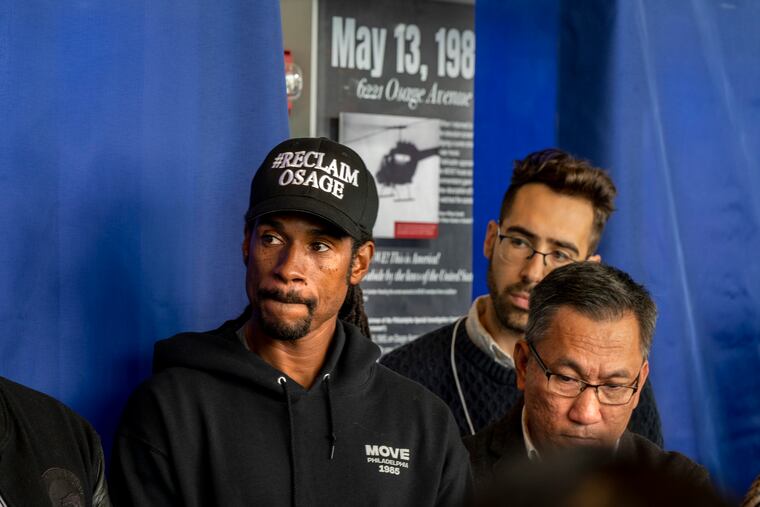1985 MOVE bombing remembered with new exhibit at city’s Municipal Services Building
The city of Philadelphia unveiled a free permanent exhibit entitled “Remembering MOVE: May 13, 1985.″

In the spring of 1985, Philadelphia police surrounded the MOVE house at 6221 Osage Ave., fired off thousands of rounds of ammunition, and poured a deluge of water on the home. Later that day police dropped a bomb on the roof, resulting in an explosion and fire that killed 11 MOVE members, including five children. Sixty-one homes were also destroyed.
On Tuesday, the city unveiled a free permanent exhibit titled “Remembering MOVE: May 13, 1985″ in the lobby of the Municipal Services Building.
Two display cases have photographs with extensive captions describing MOVE’s early history and its 1978 confrontation with the city, and the 1985 events that included the city’s bombing of the group’s house and its aftermath. A videotape has the testimony of Mayor W. Wilson Goode and other parties before the MOVE Commission hearings that followed.
Speaking before the unveiling, Mayor Jim Kenney recalled that he was in his 20s and already involved in politics when he toured the burned-out rowhouses on Osage Avenue days after the bombing. Seeing it “looking like Dresden,” he said, was one of the most transformational experiences of his life.
After a 2021 Inquirer op/ed article written by activist Abdul-Aliy Muhammad revealing that the remains of one MOVE victim had remained in the custody of two Ivy League Universities for decades, as well as revelations that the Medical Examiner’s Office mishandled other remains, Kenney ordered a review of the city’s handling of all remains from the 1985 bombing. “We would like to be the administration that gets to the bottom of everything that happened,” he said at the time.
That independent investigation, by the law firms Dechert and Montgomery McCracken Walker & Rhoads, released last year, determined that the Medical Examiner’s Office should not have considered the bone fragments in their possession as disposable, and should have immediately notified the victims’ families that it had the remains. The report also recommended that the city make a concerted effort to educate Philadelphians about the MOVE bombing.
Kenney on Tuesday said, “My hope is that ‘Remembering MOVE’ will inspire civic dialogue about Philadelphia’s controversial past and strive to prevent such a tragedy from happening again.”
Tu Huynh, with the city’s Office of Arts, Culture and the Creative Economy, curated the exhibit. He said the content “comes from a host of sources and reflections, including some from people who were directly involved. I hope it will jump-start conversations on history and how it affects what’s going on today.”
Mike Africa Jr. also attended the unveiling. He was 6 years old at the time of the bombing. His mother was pregnant with him when the earlier, 1978 Powelton Village confrontation with police took place. He was born while she was in prison.
“A lot of people are still hurting,” said Africa, an activist who has been at the forefront of efforts to ensure that Philadelphia and the rest of the country do not forget both police confrontations. In 2020, he persuaded City Council to create an annual day of “observation, reflection and recommitment” marking the anniversary, and has launched a “Reclaim Osage” campaign to repurchase the bombed MOVE house.
“We still have a long way to go, as justice has never been done,” he said.
Visitors can view the exhibit in the lobby of the Municipal Services Building, across from City Hall at 1401 John F. Kennedy Blvd., Monday through Friday, 8 a.m. to 5 p.m. Groups wanting to schedule a tour should email the Office of Arts, Culture and the Creative Economy at arts@phila.gov.